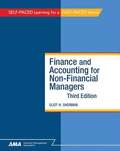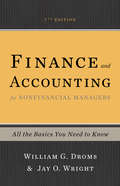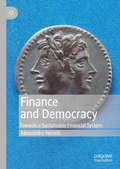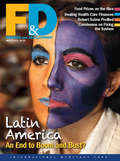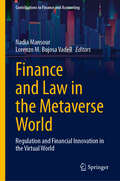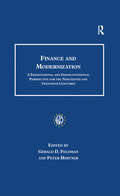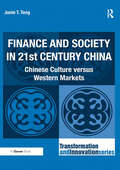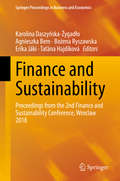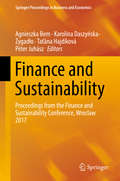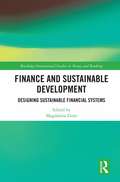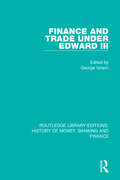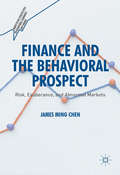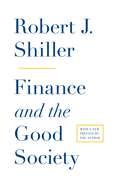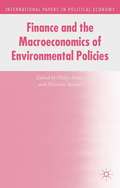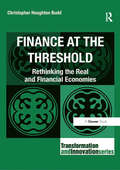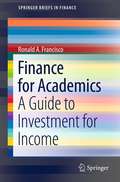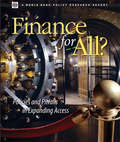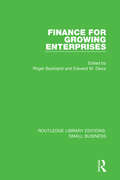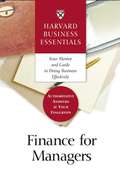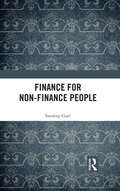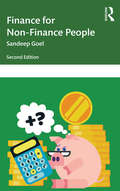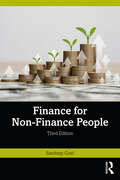- Table View
- List View
Finance and Accounting for Nonfinancial Managers, Third Edition
by Eliot H. ShermanFinance and Accounting for Nonfinancial Managers, Third Edition, introduces the reader to financial terminology, relates financial measures to operating information, enables the student to understand and apply financial measures to operating performance, and ties all of this to the current business environment. Today’s managers, whether supervisors or senior executives, are expected to understand and use financial and operational measures, prepare and utilize budgets, respond to inquiries about the financial consequences of actions taken by them or by their department or team, and understand and use financial and accounting terminology—the common language of business measurement. Written in a conversational, easy-to-understand tone, the course treats finance and accounting from the perspective of users of financial information—it enhances their ability to communicate effectively with subordinates, other managers, senior executives, and accounting and finance professionals. It offers managers the ability to use and analyze financial information to improve the performance of their operations and to identify—and avoid—potential problems. The third edition includes discussion of the continuing transition of financial reporting to an international standard as well as consideration of the effects on accounting and finance resulting from the Recession of 2007-2009. New sections on how to read an annual report and navigating the shifts in the marketplace are also included. This edition has been updated throughout to provide managers with the most current and complete information available. Selected Learning Objectives Participants will learn how to: Prepare budgets Read, understand, and use financial and operational measures Manage short-term assets Relate department performance to the big picture. This is an ebook version of the AMA Self-Study course. If you want to take the course for credit you need to either purchase a hard copy of the course through amaselfstudy.org or purchase an online version of the course through www.flexstudy.com.
Finance and Accounting for Nonfinancial Managers: All the Basics You Need to Know
by William G. Droms Jay O. WrightIn the current environment of cut-throat competition, razor-thin profit margins, and increasing scrutiny from stakeholders, mastering the fundamentals of financial management is a must for everyone with a stake in their companies and in their own professional futures. Packed with step-by-step examples and illustrative case studies, and updated to reflect the latest trends in the economy and in financial policy, Finance and Accounting for Nonfinancial Managers is a nuts-and-bolts guide for managers, entrepreneurs, seasoned executives, teachers, and students alike. Featuring new commentary on corporate accountability, updated interactive templates, study questions, and an online instructor’s guide, this new edition covers all the key aspects of financial management.
Finance and Competitiveness in Developing Countries (Routledge Studies in Development Economics)
by José María Fanelli Rohinton MedhoraThis volume represents a uniquely thorough investigation of trade and financial policy as it impacts upon Third World development. A broad range of international case studies (including Indonesia, Uruguay and Tunisia) offer a wealth of empirical material and statistical information. Thematic discussion chapters build on these case studies, offering important analysis of topics such as trade specialization and industrial change.
Finance and Democracy: Towards a Sustainable Financial System
by Alessandro VercelliThis book is an extension of the author's last book (Crisis and Sustainability: The Delusion of Free Markets, Palgrave Macmillan, 2017) and sheds light on the evolution of the financial system after the 2007/08 crisis and on changes and developments in the regulatory framework that have taken place concurrently over the last ten years. The book’s central theme addresses the neoliberal philosophy of financial regulation and, in particular, the role of self-regulating markets in the finance sector and how this has affected incentives and behaviour within the finance sector. The author contends that neoliberal maxims have led us to believe that market-based finance is superior to, and safer than, a more rules-based regulatory regime for the sector, and then explains that experience suggests otherwise. The huge expansion of ‘financialization’ in the developed economies over the last two decades has greatly magnified the risks emanating from the impact of highly leveraged, risk averse, under-regulated finance on other sectors of these economies. The author concludes that financial institutions need to be encouraged to operate within a more socially responsible matrix that facilitates and promotes long-term economic growth coupled with social stability.
Finance and Development
by International Monetary FundWhilst private finance sources (including foreign direct investment, bank lending and international bond issuance) make up most of the resource flows to middle income developing countries and transition economies, heavily indebted poor countries (HIPCs) rely largely on official development finance for investment. This report assesses developments in official financing to developing countries during the years 2000 to 2002, using current official data available up to December 2003. Issues discussed include export credits and debt restructuring with Paris Club and other bilateral creditors, trade finance in financial crises, the challenge of maintaining external debt sustainability in debtor countries, debt relief and new aid flows.
Finance and Law in the Metaverse World: Regulation and Financial Innovation in the Virtual World (Contributions to Finance and Accounting)
by Nadia Mansour Lorenzo M. Bujosa VadellThis edited volume examines the impact of the metaverse on finance and law. As the commercial development of the internet and digital technology has done for more than thirty years, the metaverse phenomenon raises questions about the relevance of existing legal rules in dealing with new practices: between the need for adaptation, evolution, or new rules. While the Blockchain ecosystem has developed steadily over the last few years and its applications are still evolving, can we assume that the metaverse will become "the most prodigious phenomenon of the 21st century"? The term metaverse refers to a virtual world. Technically, using known but evolving technologies, the term refers to a network of 3D virtual worlds. In its current state of development, there is a metaverse and not a single virtual world as there is an internal one, simply because its development is still dependent on proprietary technologies. The development of the metaverse is no less accurate, and a few recent examples suggest that lawyers will not be able to escape this phenomenon, which looks set to involve individuals, companies, and institutions. The financial world is not immune to the emergence of the metaverse either. Traditional finance is moving into new virtual worlds. Several banks and insurance companies are entering this world, far removed from their traditions. Some have even set up branches there. However, what are these financial institutions trying to achieve by entering this market segment? This book addresses these questions with contributions from academics and experts from both fields.
Finance and Modernization: A Transnational and Transcontinental Perspective for the Nineteenth and Twentieth Centuries (Studies in Banking and Financial History)
by Gerald D. FeldmanFinance and Modernization centres on a set of historical developments and problems typified by the long history of the Österreichische Creditanstalt and its successor organizations, and opens the way to compare and contrast experiences throughout Central and Western Europe and also on other continents. The structure of this volume reflects the changing role and nature of banks as economies become industrialized and modernized. Although banks adapt to the needs of an industrializing economy, at the same time, industrialization influences the manner in which banking systems grow and the structures which they adopt. Beginning with studies of the Austrian banks, their development and their crises, the volume then moves on to look at case studies of important aspects of financial activity - German stock markets, railroad investment, and information networks. This is followed by a section on country studies of banking modernization in Sweden, the Netherlands and Greece. Finally, the collection concludes with two chapters, one on banking in China and the other on banking in India, certainly both of intrinsic interest and of importance in an era of globalization. Professor Teichova, one of the great scholars in the field, concludes with reflections on the individual contributions and the general problems addressed in this book.
Finance and Society in 21st Century China: Chinese Culture versus Western Markets (Transformation and Innovation)
by Junie T. TongIn this revealing book Junie Tong reflects on the role of banking and finance in China. The author adopts a critical perspective that views the societal as well as economic functioning of banking and finance. Finance and Society in 21st Century China considers how far the modern economy is disconnected from Chinese culture and history and the problems this separation may cause. She questions the common assumption that China has outgrown its reliance on its Western counterparts. The author believes that the country is still very much dependent on exports and foreign investments and any radical or rapid reduction in either would have serious adverse consequences for China's sustainable economic growth. To provide a model for 'finance and society' that integrates culture and economy, Tong draws on the seminal work of Belgian economist, banker and social commentator, Bernard Lietaer, who has focused on cultural forces and the future of money in the world, generally. Using representative case studies for illustration, Tong applies Lietaer's work in a specifically Chinese context, highlighting the need to root finance and enterprise in the rhythms and forces within Chinese culture to avoid future chaos and achieve socio-economic stability in a country now so critical to global well-being.
Finance and Sustainability: Proceedings from the 2nd Finance and Sustainability Conference, Wroclaw 2018 (Springer Proceedings in Business and Economics)
by Agnieszka Bem Karolina Daszyńska-Żygadło Taťána Hajdíková Bożena Ryszawska Erika JákiThis volume presents the proceedings of the ZAFIN Finance and Sustainability conference, organized by the Wroclaw University of Economics in cooperation with Corvinus University of Budapest and the University of Economics in Prague. The contributing authors analyze a variety of issues concerning recent finance problems, including corporate finance, public finance, monetary and fiscal policy issues, and risk management. The book also addresses topics connected to sustainable finance, the transition to green economies, corporate sustainability and sustainable development. The target audience for this book includes researchers at universities and research and policy institutions, graduate students, and practitioners in economics and finance working for private or government institutions.
Finance and Sustainability: Proceedings from the Finance and Sustainability Conference, Wroclaw 2017 (Springer Proceedings in Business and Economics)
by Péter Juhász Agnieszka Bem Karolina Daszyńska-Żygadło Taťána HajdíkováThis volume covers the proceedings of the ZAFIN Finance and Sustainability conference, organized by the Wroclaw University of Economics in cooperation with the Corvinus University of Budapest and the University of Economics in Prague. The authors analyze a variety of issues related to recent finance problems, including corporate finance, public finance, monetary and fiscal policy issues, and risk management. The book also discusses topics related to sustainable finance, the transition to green economies, corporate sustainability and sustainable development. The target audience for this book includes researchers at universities and research and policy institutions, graduate students, and practitioners in economics, finance and international economics working for private or government institutions.
Finance and Sustainable Development: Designing Sustainable Financial Systems (Routledge International Studies in Money and Banking)
by Magdalena ZioloThere are many studies confirming the relationship between financial systems and economic development, but there are few which examine the degree to which financial systems a) impact the quality of information, b) influence sound corporate governance, c) ensure effective mechanisms of risk management, d) mobilize savings and f) facilitate trade. In the context of sustainability, there should also be a line of inquiry into how a particular financial system influences the assurance and implementation of sustainable development principles and goals. This book delivers a methodological approach to designing and assessing sustainable financial systems. It provides an original contribution by prioritizing ESG factors in the decision-making process of financial institutions and identifying their impact on sustainable financial systems. The author argues that to achieve financial stability, it is necessary to have in place mechanisms designed to prevent financial problems from becoming systemic and/or threatening the stability of the financial and economic system, while maintaining (or not undermining) the economy’s ability to sustain growth and perform its other functions. The book primarily takes a simulation and experimental approach. It is the first book to take such a comprehensive look at sustainable financial systems as opposed to sustainable finance in general. It will appeal to academics, students and researchers in the fields of economics, finance and banking, business, management and political and social sciences.
Finance and Trade Under Edward III: By Members Of The History School (classic Reprint) (Routledge Library Editions: History of Money, Banking and Finance #8)
by Unwin GeorgeThese important essays, first published in 1918, consider the various economic aspects of the reign of Edward III. They support George Unwin’s contention that the measures of the king and parliament were mainly opportunist rather than the expression of a definite financial policy.
Finance and the Behavioral Prospect
by James Ming ChenThis book explains how investor behavior, from mental accounting to the combustible interplay of hope and fear, affects financial economics. The transformation of portfolio theory begins with the identification of anomalies. Gaps in perception and behavioral departures from rationality spur momentum, irrational exuberance, and speculative bubbles. Behavioral accounting undermines the rational premises of mathematical finance. Assets and portfolios are imbued with “affect.” Positive and negative emotions warp investment decisions. Whether hedging against intertemporal changes in their ability to bear risk or climbing a psychological hierarchy of needs, investors arrange their portfolios and financial affairs according to emotions and perceptions. Risk aversion and life-cycle theories of consumption provide possible solutions to the equity premium puzzle, an iconic financial mystery. Prospect theory has questioned the cogency of the efficient capital markets hypothesis. Behavioral portfolio theory arises from a psychological account of security, potential, and aspiration.
Finance and the Good Society
by Robert J. ShillerNobel Prize-winning economist explains why we need to reclaim finance for the common goodThe reputation of the financial industry could hardly be worse than it is today in the painful aftermath of the 2008 financial crisis. New York Times best-selling economist Robert Shiller is no apologist for the sins of finance—he is probably the only person to have predicted both the stock market bubble of 2000 and the real estate bubble that led up to the subprime mortgage meltdown. But in this important and timely book, Shiller argues that, rather than condemning finance, we need to reclaim it for the common good. He makes a powerful case for recognizing that finance, far from being a parasite on society, is one of the most powerful tools we have for solving our common problems and increasing the general well-being. We need more financial innovation—not less—and finance should play a larger role in helping society achieve its goals.Challenging the public and its leaders to rethink finance and its role in society, Shiller argues that finance should be defined not merely as the manipulation of money or the management of risk but as the stewardship of society's assets. He explains how people in financial careers—from CEO, investment manager, and banker to insurer, lawyer, and regulator—can and do manage, protect, and increase these assets. He describes how finance has historically contributed to the good of society through inventions such as insurance, mortgages, savings accounts, and pensions, and argues that we need to envision new ways to rechannel financial creativity to benefit society as a whole.Ultimately, Shiller shows how society can once again harness the power of finance for the greater good.
Finance and the Macroeconomics of Environmental Policies
by Philip Arestis Malcolm SawyerThis volume examines current and previous environmental policies, and suggests alternative strategies for the future. Addressing resource depletion and climate change are pressing priorities for modern economies. Planning energy infrastructure projects is complicated by uncertainty, as such clear government policies have a crucial role to play.
Finance at Work (Routledge International Studies in Money and Banking)
by Valérie BoussardIn the collective psyche, a financier is a capitalist. In managerial capitalism, the notion of the ‘manager’ emerged, and the role of the manager was distinct from the role of the ‘owner’. Financial capitalism is similarly underpinned by financiers who are not the holders of the financial assets they buy, sell, trade or advise upon. Finance at Work explores the world of financiers, be they finance-oriented CEOs, CFOs, financial journalists, mergers and acquisitions’ advisors or wealth managers. Part I investigates the professional trajectories of members of corporate boards and financialisation as the dissemination of financial logic outside its primary ‘iron cage’; Part II responds by studying financiers at work within financial occupations or financial operations involving external actors; while Part III pursues the issue of financial boundaries by seeking out the way financial logic crosses these boundaries. Part IV takes back the hypothesis of differentiations within finance presented in Part I, and analyses the internal boundaries of asset management, wealth management and leveraged buyout (LBO) acquisitions. This book is essential reading for researchers and academics within the field of finance who aim to understand the ‘spread of finance’ in contemporary societies.
Finance at the Threshold: Rethinking the Real and Financial Economies (Transformation and Innovation)
by Christopher Houghton BuddEvery banking crisis, whatever its particular circumstances, has two features in common with every previous one. Each has been preceded by a period of excessive monetary ease, and by ill thought out regulatory changes. For many the recent hiatus in inter-bank lending has been seen as a blip - enormous in size and global in scope, but, nonetheless, a blip. Finance at the Threshold offers a unique perspective from an English economic and monetary historian. In it the author asks: Why did the banks stop lending to one another, and why now? Was it merely a matter of over-loose credit due to the relaxation of traditional prudence, or did global finance find itself at its limits? Have government bail-outs saved the day or merely postponed the problem? Christopher Houghton Budd offers a radical view of the global financial crisis, spanning a wide gamut of current thinking. He argues that we need, above all, to overcome the left-right divide so much taken for granted today, and promote financial literacy to young people. His contribution to the Transformation and Innovation Series claims that global finance has brought us to the limits of what mechanistic economic explanations can capture. New ideas and above all new instruments are needed so that innovation can shift from its dexterous exploitation of inefficiencies and turn its attention instead to fresh initiative. Finance at the Threshold is essential reading for academics and practitioners concerned with financial and economic policy and needing to develop a sense of the history thus understanding the forward prospects for global finance.
Finance for Academics
by Ronald A. FranciscoThe purpose of this book is to provide a hands-on guide to finance and investment for academics with an objective of providing strategies to maximize income, minimize fees, and legally minimize taxes. There are many risks in finance and investment such as stock market crashes, inflation, corruption, fees and interest rates. This book stresses that stocks and bonds are the mainstay of most investors. Dividend-growth stocks mitigate the risk of inflation. In addition, they cost nothing once they are purchased, unlike mutual funds that have constant fees. The author explains how to find dividend-growth stocks whose payout increase exceeds inflation and how to compound quarterly in order to make projections for future growth in the number of shares or in the value of the capital itself. The author, in addition, discusses the value of bond funds and master-limited partnerships for an investment portfolio. Retirement income is a major concern for senior academics and the median level of retirement savings for those 55 to 64 is only $145,000, which is insufficient. The author stresses the need to mix dividend-growth stocks and closed-end bond funds to fund retirement as well as explains Roth IRAs, 401(k)s and other such tax-free forms of retirement financing. Finally, the book examines financial risks and shows how to mitigate them to the extent possible. This book is a must-have for any professor or academic approaching retirement age or looking to secure their future income.
Finance for All? Policies and Pitfalls in Expanding Access
by World BankAccess to financial services varies sharply around the world. In many developing countries less than half the population has an account with a financial institution, and in most of Africa less than one in five households do. Lack of access to finance is often the critical mechanism for generating persistent income inequality, as well as slower growth. 'Finance for All?: Policies and Pitfalls in Expanding Access' documents the extent of financial exclusion around the world; addresses the importance of access to financial services for growth, equity and poverty reduction; and discusses policy interventions and institutional reforms that can improve access for underserved groups. The report is a broad ranging review of the work already completed or in progress, drawing on research utilizing data at the country, firm and household level. Given that financial systems in many developing countries serve only a small part of the population, expanding access remains an important challenge across the world, leaving much for governments to do. However, not all government actions are equally effective and some policies can be counterproductive. The report sets out principles for effective government policy on broadening access, drawing on the available evidence and illustrating with examples.
Finance for Growing Enterprises (Routledge Library Editions: Small Business)
by Roger Buckland Edward W. DavisThis volume, originally published in 1995, examines the mechanisms by which businesses that have the capacity to grow – whether in terms of output, innovation or export – acquire the cash that enables growth. Addressing an issue of central importance to the competitiveness of firms and economies, this book draws together research by leading academics in the area. Throughout, research studies develop the themes of market failure, finance gaps and failure of demand. They also bring out the linkages between the financing choices facing the growing firm and the issues of organisation and of corporate governance that have to be address during the process of growth and maturity. Contributors challenge financial orthodoxy throughout, providing coherent analyses of the difficulties faced in the finance of the growing enterprise, from its early dependence on banks and informal finance to the pinnacle of a stock exchange listing.
Finance for Managers
by Harvard Business School PressHarvard Business Essentials are comprehensive, solution-oriented paperbacks for business readers of all levels of experience. Calculating and assessing the overall financial health of the business is an important part of any managerial position. From reading and deciphering financial statements, to understanding net present value, to calculating return on investment, Finance for Managers provides the fundamentals of financial literacy. Easy to use and nontechnical, this helpful guide gives managers the smart advice they need to increase their impact on financial planning, budgeting, and forecasting.
Finance for Managers: Custom Text Version 2 (BUSN #5200)
by Joe Andrew Brad ScottContents of the book include: Introduction to Financial Management; Accounting--Present and Past; Financial Statements and Accounting Concepts/Principles; Financial Analysis; Budgeting fundamentals; The Time Value of Money; Capital Investment Decisions; and Appendix: Interest Tables.
Finance for Non-Finance People
by Sandeep GoelFinance is key to every business organization as well as outside. This book makes sense of the finance world from a non-finance perspective. It introduces, explains and demystifies essential ideas of business finance to those who do not have financial background or training. Lucid, accessible yet comprehensive, the book delineates the financial workings of businesses and offers an overview of corporate finance in the global context. The volume: Contains effective tools for financial communication, monitoring, analysis and resource allocation Provides important learning aids such as figures, tables, illustrations and case studies Highlights fundamental concepts and applications of finance Surveys global corporate practices, recent trends and current data A guide to building financial acumen, this book will be a useful resource for executive and management development programmes (EDPs & MDPs) oriented towards business managers, including executive MBA programmes. It will benefit business executives, corporate heads, entrepreneurs, government officials, teachers, researchers and students of management and business besides those who deal with finance or financial matters in their daily lives.
Finance for Non-Finance People
by Sandeep GoelFinance is key to every business organisation as well as outside. This book makes sense of the finance world from a non-finance perspective. It introduces, explains and demystifies essential ideas of business finance to those who do not have financial background or training. Lucid, accessible yet comprehensive, the book delineates the financial workings of businesses and offers an overview of corporate finance in the global context. The volume: Contains effective tools for financial communication, monitoring, analysis and resource allocation Provides important learning aids such as figures, tables, illustrations and case studies Highlights fundamental concepts and applications of finance Surveys global corporate practices, recent trends and current data This updated second edition contains new sections on Tax Planning, including Income Tax and Goods and Services Tax in India. A guide to building financial acumen, this book will be a useful resource for executive and management development programmes (EDPs & MDPs) oriented towards business managers, including MBA programmes. It will benefit business executives, corporate heads, entrepreneurs, government officials, teachers, researchers and students of management and business besides those who deal with finance or financial matters in their daily lives.
Finance for Non-Finance People
by Sandeep GoelThis book makes sense of the finance world from a non-finance perspective. It introduces, explains and demystifies essential ideas of business finance to those who do not have a financial background or training. The book delineates the financial workings of businesses and offers an overview of financial management in a global context. The volume: Discusses fundamental concepts and applications of accounting and finance at the global level Contains effective tools for financial analysis, communication, monitoring and resource allocation Provides important instructional aids such as figures, tables, illustrations and real-world corporate case studies to facilitate learning Is concise in form yet comprehensive in content, delivering in-depth coverage of the five key constituents and entire gamut of the finance domain – financial accounting, cost accounting, financial management, financial markets and tax planning Is thoroughly updated with the latest concepts, international corporate practices, recent trends and current data with a vivid visual impact for a pleasurable reading and learning experience. Lucid, accessible and comprehensive, this third edition is a revised version in accordance with the current finance laws, practices and data. A guide to building financial acumen and literacy, it will be a useful resource for executive and management development programmes (EDPs & MDPs) oriented towards business managers and management students, including MBA programmes, and allied disciplines of commerce, finance, economics and others. It will also benefit business executives, corporate heads, entrepreneurs, government officials, academicians of business and allied disciplines, as well as those who deal with finance or financial matters in their daily lives.
